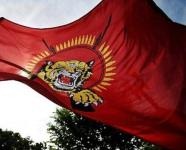 India broke with past practice on Tuesday and called on Sri Lanka to investigate allegations of human rights abuses during the island’s civil war, upping pressure on President Mahinda Rajapakse.
India broke with past practice on Tuesday and called on Sri Lanka to investigate allegations of human rights abuses during the island’s civil war, upping pressure on President Mahinda Rajapakse.
India has not joined recent demands from the United Nations and Western countries for a probe into alleged war crimes committed during the final stages of the conflict which ended in May 2009 with the crushing of Tamil rebels.
During a visit by Sri Lankan Foreign Minister G.L. Peiris to New Delhi, India "urged the expeditious implementation of measures by the government of Sri Lanka, including… investigations into allegations of human rights violations," a statement said.
The strongly worded message comes amid tensions over fishing rights in the sea separating the two countries which have resulted in several Indian fishermen being shot dead by the Sri Lankan navy.
As well as a rights’ investigation, India also pushed for speedy resettlement of ethnic Tamils displaced by fighting; "genuine reconciliation" with the ethnic minority group and the early end of emergency laws.
Sri Lanka is extremely sensitive about interference in its internal affairs and has vigorously resisted pressure for a war crimes investigation, insisting its own probe — condemned by international human rights groups as a sham — is sufficient.
In a military campaign that has since been dogged by war crimes allegations, Sri Lanka’s army defeated the Tamil Tiger separatist rebellion in May 2009, ending 37 years of bloodshed.
The tropical Indian Ocean island is a mostly Buddhist nation ruled by the majority Sinhala ethnic group, but with large ethnic Tamil populations in the north and east.
Peiris told reporters that Sri Lanka was "forging ahead having left terrorism behind us," adding that the mood on the island was one of "hope and aspiration for the future."
"The need of the hour is a sense of oneness and solidarity. The wounds of past should be allowed to heal," he said. "This is a time for rapprochement, to leave behind the pain and anguish of the past."
(For updates you can share with your friends, follow TNN on Facebook and Twitter )
